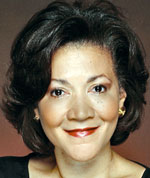
By Vicky Dickson
It has to be daunting to discover in the midst of a book project that you’re working on the wrong book. That you feel compelled to write something quite different from what you told your boss and editor you’d be coming out with. It happened, though, to NPR’s Michele Norris, who came to UNC’s Carroll Hall in early December to talk about the book that resulted from this disconcerting discovery.
Norris’ “accidental memoir,†The Grace of Silence, had its beginnings in a series of conversations she and her All Things Considered co-host, Steve Inskeep, had with a diverse group of residents of York, Pa. Questions like “Do black Americans make too much of race?†and “What does Joe Six-pack look like?†made “magical radio, because it was so honest,†Norris said, and she wanted to continue the conversation. So she started traveling the country listening to people sharing their thoughts about race in order to gather material for a book of essays about race in Barack Obama’s America.
Then Norris began to realize that her efforts were sparking conversations within her own family. Her uncles, in particular, had stories bubbling up – always over food – in a kind of “historic indigestion.†And their stories, to Norris’ great surprise, included some extraordinary ones about the parents Norris had assumed to be absolutely ordinary.
There was the revelation that Norris’ Grandma Ione, a woman who’d always dressed as though she were going to high church, had once traveled the Midwest for Quaker Oats with a kerchief on her head. That job, pretending to be Aunt Jemima, required the woman who’d always stressed correctness in her speech (if someone said a word like “fixin’†in her presence, she’d respond, “Did you leave Mr. G outside?â€) to pretend to be an uneducated slavewoman.
It was a job that could easily have been denigrating. But Norris saw that her grandmother had done it in her own way, with great dignity. Despite her own mother’s anger at the telling of the story, Norris realized that in traveling to places where people had never seen a black person, singing gospel songs and focusing on the young people in her audience, Grandma Ione had done her job in such a way that she lifted up both her people and herself.
An uncle’s revelation about her father, though, proved more disconcerting. When Norris heard that her Navy-veteran father had, upon returning to Alabama after World War II, been shot in the leg by a white policeman, she needed to know why. With her uncle hazy on the details and her father no longer around to ask, Norris turned her literary efforts toward researching what had happened to her father, and eventually to what had happened to other black military veterans.
The stories she uncovered about the humiliation and violence inflicted on returning black veterans are shameful. The story she was told by her grandparents’ former neighbor, who’d seen a car full of laughing white kids throwing rotten tomatoes at the immaculately dressed couple, would make anyone’s blood boil.
The fact that Norris’ parents and grandparents chose not to respond to such trials with bitterness and hatred is remarkable. Their way of putting injustice, humiliation and pain behind them, of moving on, is an example of truly amazing grace. The grace of silence.
Norris points out, however, that while there’s grace in silence, there is power in words. And in questions and conversation. So she encourages her listeners to participate in a conversation about race – perhaps by logging onto her website, michele-norris.com, and expressing their thoughts about race in six words. She finds it interesting that she herself is now participating in the conversation that she originally intended. The “wrong book†may yet be written after all.
•••••••••••••••••••••••••••••••••••••••••••••••••••••••••••••••••
Heidi Durrow, author of The Girl Who Fell From the Sky, will join the staff of Algonquin Books at Flyleaf Books on Jan. 6 from 6 to 8 p.m. for Book Club Night. Enjoy a glass of wine and a snack while you hear about some great book-club picks; there’ll also be a prize giveaway that includes tickets to an upcoming PlayMakers Repertory Company production.
Local poet and professor Michael Chitwood will be at McIntyre’s Books on Jan. 15 at 11 a.m. to read from Poor-Mouth Jubilee, his seventh poetry collection. Chitwood’s description of the poems as “ghost stories, both holy and profane, and the ghosts have their motorcycles, their shotguns, and their public address systems†promises a most intriguing event.